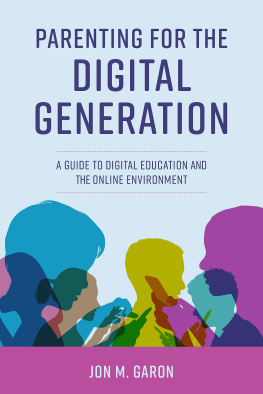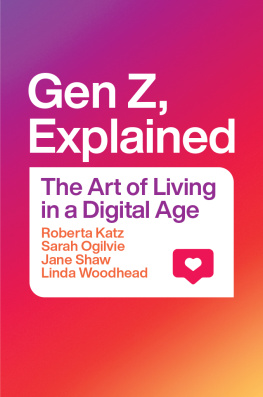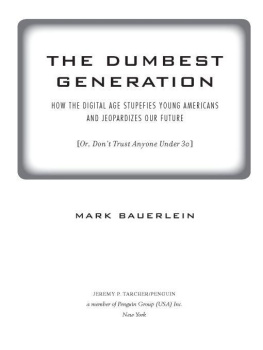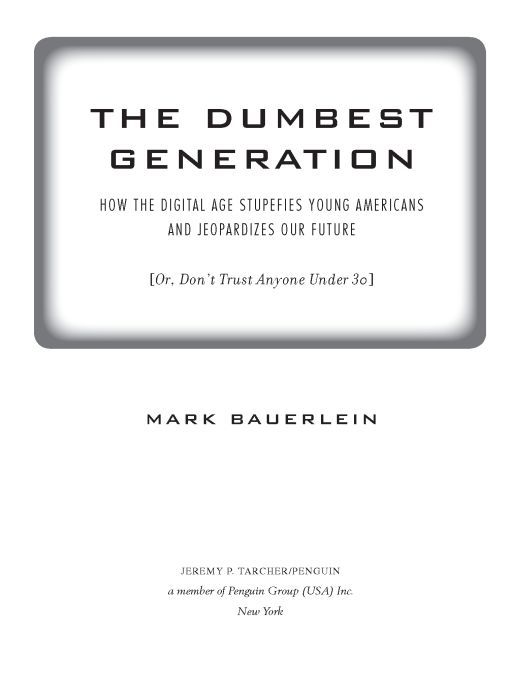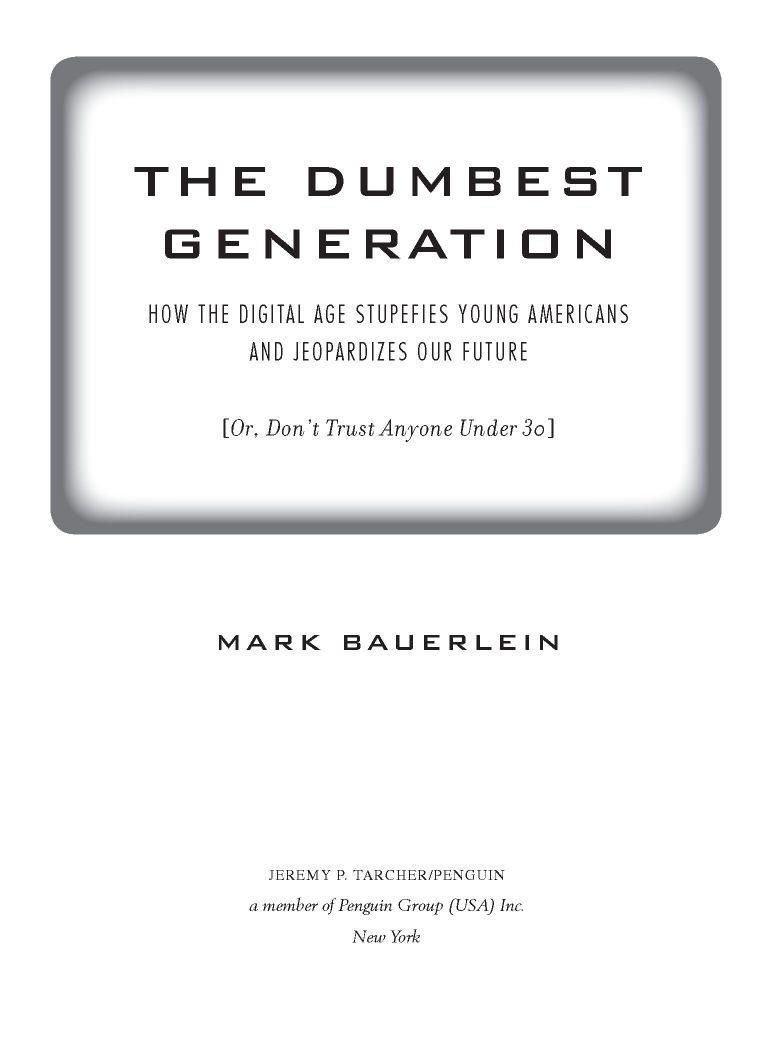Table of Contents
INTRODUCTION
When writer Alexandra Robbins returned to Walt Whitman High School in Bethesda, Maryland, ten years after graduating, she discovered an awful trend. The kids were miserable. She remembers her high school years as a grind of study and homework, but lots more, too, including leisure times that allowed for well-roundedness. Not for Whitman students circa 2005. The teens in The Overachievers, Robbinss chronicle of a year spent among them, have only one thing on their minds, SUCCESS, and one thing in their hearts, ANXIETY. Trapped in a mad culture of overachieverism, they run a frantic race to earn an A in every class, score 750 or higher on the SATs, take piano lessons, chalk up AP courses on their transcripts, stay in shape, please their parents, volunteer for outreach programs, and, most of all, win entrance to HYP (Harvard-Yale -Princeton).
As graduation approaches, their rsums lengthen and sparkle, but their spirits flag and sicken. One Whitman junior, labeled by Robbins The Stealth Overachiever, receives a fantastic 2380 (out of 2400) on a PSAT test, but instead of rejoicing, he worries that the company administering the practice run made the diagnostics easier so students would think the class was working.
Audrey, The Perfectionist, struggles for weeks to complete her toothpick bridge, which she and her partner expect will win them a spot in the Physics Olympics. Shes one of the Young Democrats, too, and she does catering jobs. Her motivation stands out, and she thinks every other student competes with her personally, so whenever she receives a graded test or paper, she [turns] it over without looking at it and then [puts] it away, resolving not to check the grade until she [gets] home.
AP Frank became a Whitman legend when as a junior he managed a seven-AP course load that had him studying every afternoon, sleeping during class, and going lunchless. When he scored 1570 on the SAT, his domineering mother screamed in dismay, and her shock subsided only when he retook it and got the perfect 1600.
Julie, The Superstar, has five AP classes and an internship three times a week at a museum, and she runs cross-country as well. Every evening after dinner she descends to the homework cave until bedtime and beyond. She got only 1410 on the SAT, though, and she wonders where it will land her next fall.
These kids have descended into a competitive frenzy, Robbins mourns, and the high school that should open their minds and develop their characters has become a torture zone, a hotbed for Machiavellian strategy. They bargain and bully and suck up for better grades. They pay tutors and coaches enormous sums to raise their scores a few points and help with the admissions process. Parents hover and query, and they schedule their children down to the minute. Grade inflation only makes it worse, an A- average now a stigma, not an accomplishment. They cant relax, they cant play. Its killing them, throwing sensitive and intelligent teenagers into pathologies of guilt and despair. The professional rat race of yoremen in gray flannel suits climbing the business ladderhas filtered down into the pre-college years, and Robbinss tormented subjects reveal the consequences.
The achievement chase displaces other life questions, and the kids cant seem to escape it. When David Brooks toured Princeton and interviewed students back in 2001, he heard of joyless days and nights with no room for newspapers or politics or dating, just one skill-enhancing activity to the next. He calls them Organization Kids (after the old Organization Man figure of the fifties), students who have to schedule appointment times for chatting. Theyve been programmed for success, and a preschool-to-college gauntlet of standardized tests, mounting homework, motivational messages, and extracurricular tasks has rewarded or punished them at every stage. The system tabulates learning incessantly and ranks students against one another, and the students soon divine its essence: only results matter. Education writer Alfie Kohn summarizes their logical adjustment:
Consider a school that constantly emphasizes the importance of performance! results! achievement! success! A student who has absorbed that message may find it difficult to get swept away by the process of creating a poem or trying to build a working telescope. He may be so concerned about the results that hes not at all that engaged in the activity that produces those results.
Just get the grades, they tell themselves, ace the test, study, study, study. Assignments become exercises to complete, like doing the dishes, not knowledge to acquire for the rest of their lives. The inner life fades; only the external credits count. After-school hours used to mean sports and comic books and hanging out. Now, they spell homework. As the president of the American Association of School Librarians told the Washington Post, When kids are in school now, the stakes are so high, and they have so much homework that its really hard to find time for pleasure reading (see Strauss). Homework itself has become a plague, as recent titles on the subject show: The End of Homework: How Homework Disrupts Families, Overburdens Children, and Limits Learning (Etta Kralovec and John Buell); The Homework Myth: Why Our Kids Get Too Much of a Bad Thing (Alfie Kohn); and The Case Against Homework: How Homework Is Hurting Our Children and What We Can Do About It (Sara Bennett and Nancy Kalish).
Parents, teachers, media, and the kids themselves witness the dangers, but the system presses forward. We believe that reform in homework practices is central to a politics of family and personal liberation, Kralovec and Buell announce, but the momentum is too strong. The overachievement culture, results-obsessed parents, outcomes -based norms... they continue to brutalize kids and land concerned observers such as Robbins on the Today show. Testing goes on, homework piles up, and competition for spaces in the Ivies was stiffer in 2007 than ever before. A 2006 survey by Pew Research, for instance, found that more than half the adults in the United States (56 percent) think that parents place too little pressure on students, and only 15 percent stated Too much.
Why?
Because something is wrong with this picture, and most people realize it. They sense what the critics do not, a fundamental error in the vignettes of hyperstudious and overworked kids that weve just seen: they dont tell the truth, not the whole truth about youth in America. For, notwithstanding the poignant tale of suburban D.C. seniors sweating over a calculus quiz, or the image of college students scheduling their friends as if they were CEOs in the middle of a workday, or the lurid complaints about homework, the actual habits of most teenagers and young adults in most schools and colleges in this country display a wholly contrasting problem, but one no less disturbing.
Consider a measure of homework time, this one not taken from a dozen kids on their uneven way to the top, but from 81,499 students in 110 schools in 26 statesthe 2006 High School Survey of Student Engagement. When asked how many hours they spent each week Reading/studying for class, almost all of them, fully 90 percent, came in at a ridiculously low five hours or less, 55 percent at one hour or less. Meanwhile, 31 percent admitted to watching television or playing video games at least six hours per week, 25 percent of them logging six hours minimum surfing and chatting online.


